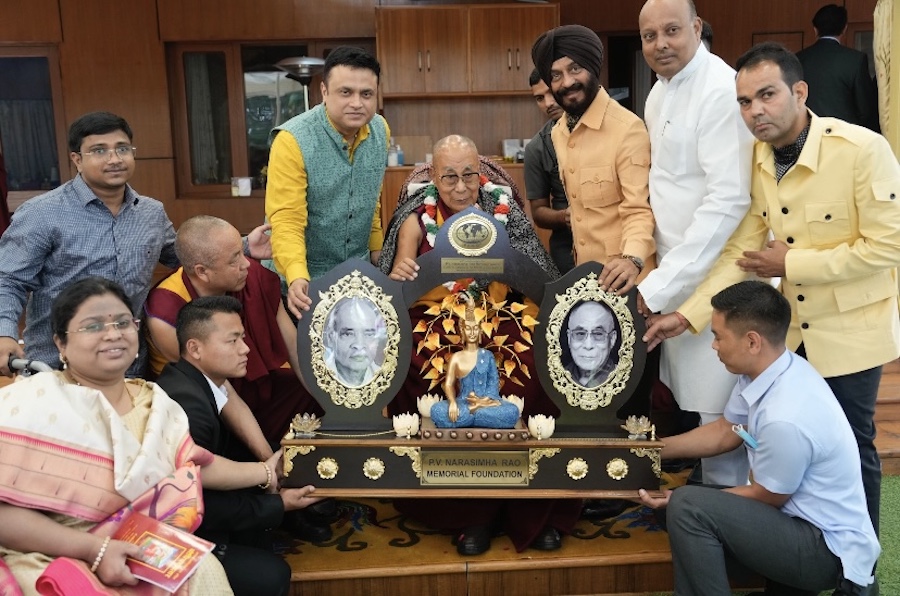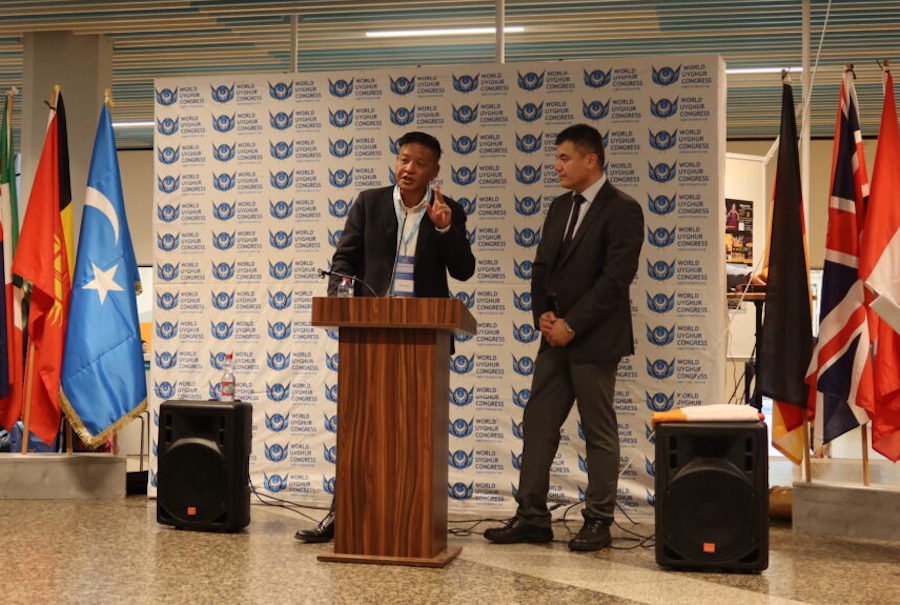By Tsewang Namgyal
 There are demonstrated benefits from mindfulness techniques such as paying attention to one’s breathing to help manage stress, develop resilience, increase productivity and have a more positive impact on society. However, in my experience, and as I explain below, I find it more powerful to use techniques that involve analysis to generate compassion as a more sustainable method to achieve the above results.
There are demonstrated benefits from mindfulness techniques such as paying attention to one’s breathing to help manage stress, develop resilience, increase productivity and have a more positive impact on society. However, in my experience, and as I explain below, I find it more powerful to use techniques that involve analysis to generate compassion as a more sustainable method to achieve the above results.
In 1992 I emigrated to the United States from India under the 1,000 Tibetan resettlement project. For me, moving to the United States was even more exciting than if I were journeying to outer space.
Although I am now a citizen in the world’s most powerful country; have a good job at one of the largest banks in the world with trillions of dollars in assets; a great network of kind and resourceful friends and an amazingly loving and supportive family there are times when my stress level gets a bit out of control and I lose perspective. When I was a refugee and studied at a missionary school in Kalimpong, India I would sometimes think that if you have all the good food you can eat there is no reason to be overly stressed. Food used to be always in our mind then.
Now I have realized that the developed world has its own unique sources of stress. While I appreciate that a certain level of stress is healthy, there are challenges that even very materially successful colleagues and friends have shared with me where my heart goes out to them. Many a time the stress derives from our inability to put life into perspective and we get consumed by toxic thoughts.
I have also realized that it’s naïve to think that wealth or power can make a person more mentally calmer and resilient.
It is in our mind where we experience happiness and suffering no matter your position in the world. If we are able to generate a compassionate mind and get more control over our mind this will better allow us to put things into perspective as we are able to relate to others better. Here I would like to share a mental exercise to generate compassion that I learned from our elders.
1. Remind yourself that for the next 20 minutes you will focus on your practice. This commitment will be useful.
2.
When the two obstacles of (i) distraction and (ii) laziness arise, during your contemplation you can remind yourself of your commitment to get back to your practice.
3. Recommended postures are the following: (i) sit cross-legged or on a chair with your foot on the ground, (ii) have your right hand gently on your left hand with palms up, (iii) straight back, (iv) shoulders opened up so you can breathe freely, (v) chin slightly tucked, (vi) your tongue to touch to top of your palate, and (vii) eyes focused gently on the tip of your nose.
4. Start by simply paying attention to your breathing. This helps anchor your attention to your breath and calm your scattered thoughts.
5. Set your motivation by reciting the Four Immeasurables.
6. Visualize your mother in front of you, whether she is alive or not, looking at you with loving eyes and smiling.
7. Remember that she went through much discomfort while carrying you in her womb for nine months.
While pregnant, she avoided food or drink that could be harmful to you.
8. During birth she went through much pain.
9. After birth she fed you, cared for you, and taught you. It was her compassion that allowed you to exist, because as an infant you were helpless.
10. Now after reflecting on your mother’s compassion, think that you have a responsibility to repay her compassion. It would be very self-centered not to think of repaying your mother’s compassion.
11. Now reflect that just as your mother has been compassionate, other mothers have been compassionate to their children. Just as you would want others to be compassionate to your mother, you should become compassionate to other people’s mothers.
12. Stay in this state of contemplation for few minutes.
The silent contemplation state helps you to transform your mind. Knowledge is not sufficient. If it were, no medical doctors would be smoking or become alcoholics since they know the negative consequences.
In our normal habitual thought process, we tend to go through analysis that normally strengthens our destructive emotions such as hatred or jealousy.
Many a time these analyses are based on false assumptions and your habitual skills are so powerful that you can become full of rage over something minor. Here in this practice, we purposely go through a contemplation exercise focused on our mother or a mother-like figure to build on our compassion based on reason.
Well Being and Business Impact
Over last three years, I have been sharing many of these techniques that I learned from our elders to my colleagues in our bank and friends in the corporate world. Initially there was a certain level of healthy skepticism. Now it has been embraced at all levels within our bank and employees at few other firms. We have set up Mindfulness Groups within our bank in the United States (five locations), Canada, Argentina, Mexico and Chile.
A colleague told me how this mental exercise helped transform his relationship with his wife from one driven by anger to a loving one. This has both his well-being and marriage. Examples like this have inspired me to keep promoting mindfulness and compassion techniques.
On the business side, these techniques have improved collaboration and productivity. Let me illustrate this by a case study on how these techniques had some influence on projects that are combined worth billions of dollars.
The investment banking side of our business is in general divided into the front office and the credit risk function. The front office identifies deals, and credit either approves or rejects them. By design, credit is in conflict with the front office, though both functions serve important objectives of the bank.
Colleagues have shared with me that mindfulness helped them to become better listeners, which enables them to understand proposed transactions more quickly. Compassion helps them to have an open dialogue about the key issues. In addition, these exercises helped them to calm their minds, allowing them to be less prone to impatience.
There is always a danger that the creative tension deliberately developed between the front office and credit side can become destructive if judgments get blurred due to an inability to better manage emotions such as anger.
Channeling negative emotions such as anger can help generate strong short-term results and achievements. However, over the longer term this tends to turn to resentment, resistance, and loss of respect. This is because anger has a strong potential to lead to a breakdown of communications, misunderstanding, and bad decisions. In addition, inability to manage negative emotions can lead to stress overload and undermine your well-being.
Colleagues have shared with me that the partnership approach between front office and credit leads to overall better results for the bank by achieving long-term, sustainable growth of the business.
Over 650 colleagues are now members in our bank’s Mindfulness Group, and thousands have attended our various sessions, in person or virtually. Personally, I found these simple exercises to be a very powerful means to become more resilient. When my stress threatens to get out of control, the techniques have allowed me to quickly put things into perspective. More importantly it has taught me how to motivate myself and others.
Conclusion
As Tibetans we were raised by many of these techniques. His Holiness the Dalai Lama and many of our elders are living examples of mindfulness and compassion. Unfortunately, we have not able to apply many of these techniques to improve collaboration and effectiveness among our various organizations within our own community to achieve common goals.
This has lead to unnecessary conflict and waste of valuable energy, time and resources. It pains me to witness some of the dire challenges within our community considering the solutions are right in the palm of our hand and cannot be solved unless through simple collaboration.
As I have grown older my appreciation on the wisdom of our elders continues to grow. I want to take this opportunity to share the above thoughts in particularly to the younger Tibetan generation so that you will realize the value of our culture much before me. In addition, I hope you will be more successful, than my generation, in applying these techniques to our own Tibetan community to develop sustainably, become more resilient and unlock the full potential of our community.
The author is an MBA graduate (Beta Gamma Sigma Honor Society member) from the Thunderbird School of Global Management and works in the Investment Banking field in New York City. He currently serves on the Board of The Tibet Fund and is the Advisory Chair of the Reimagining Doeguling project (https://www.facebook.com/Doeguling/)
[OPINION-DISCLAIMER]









